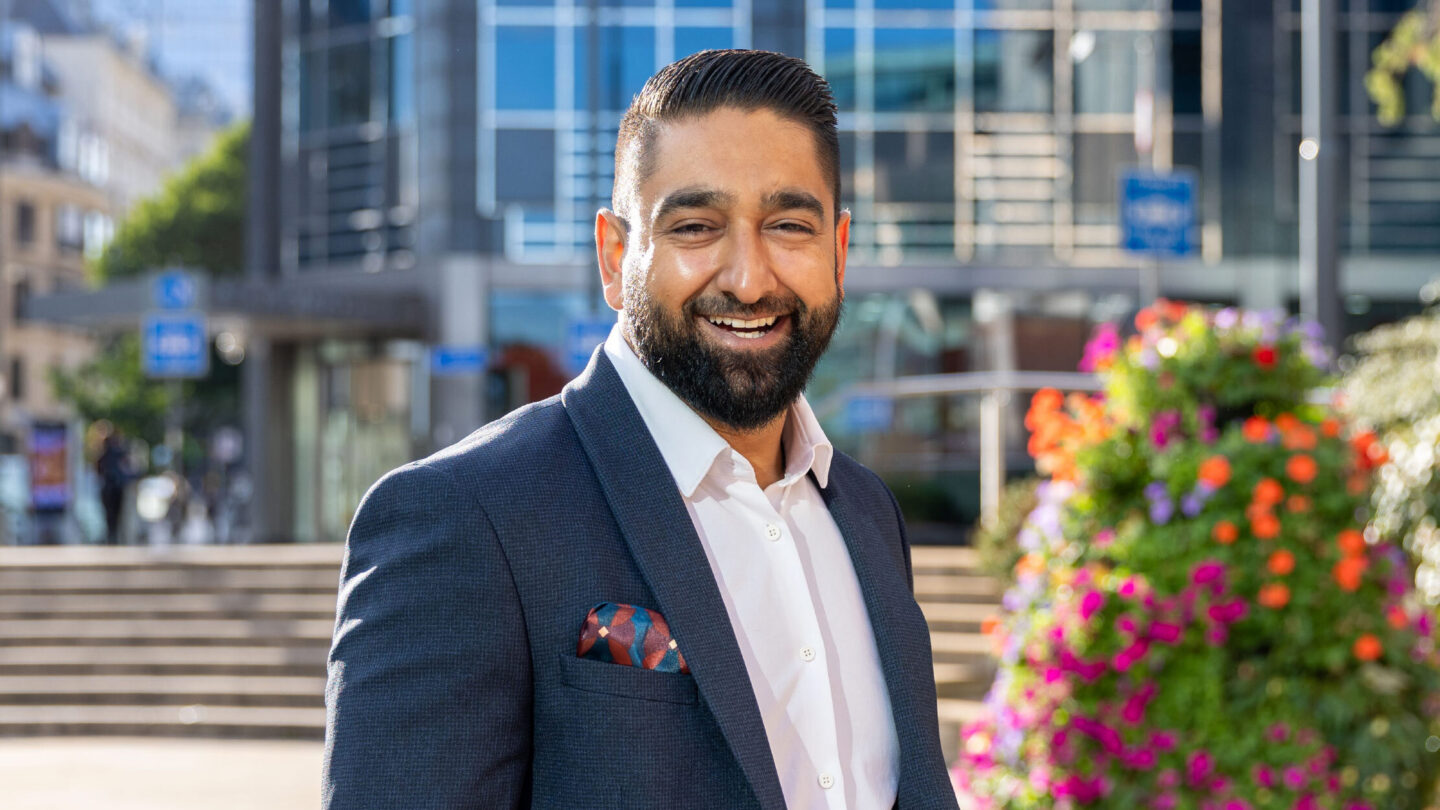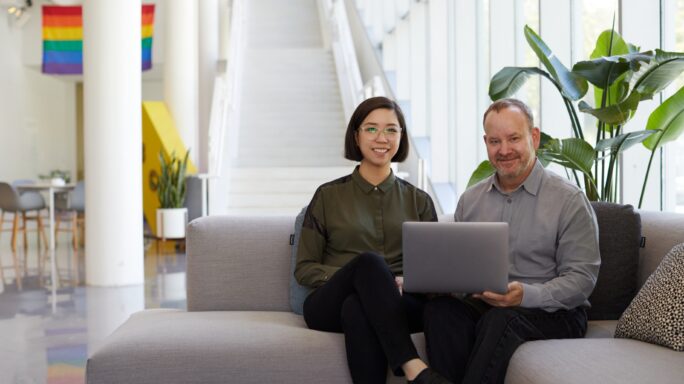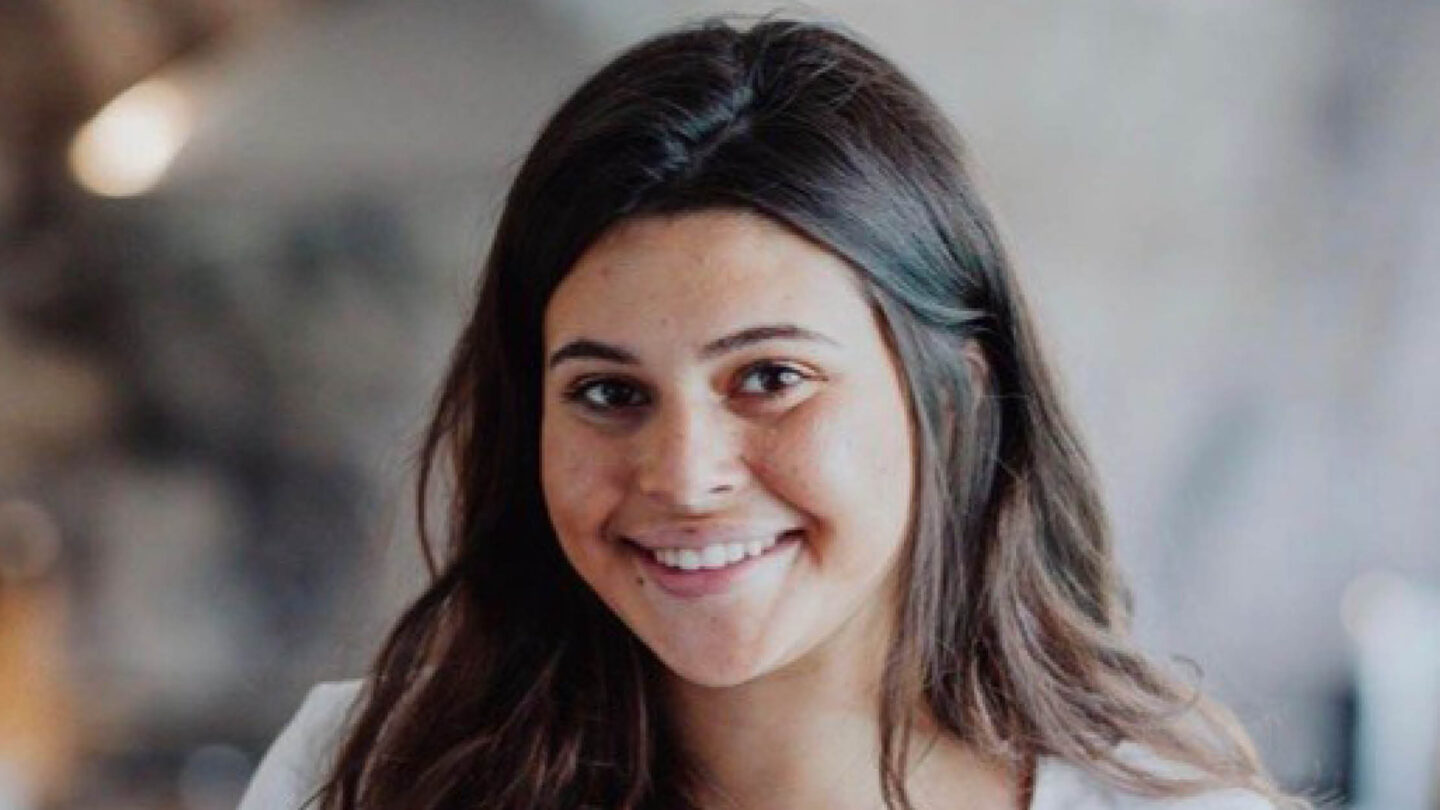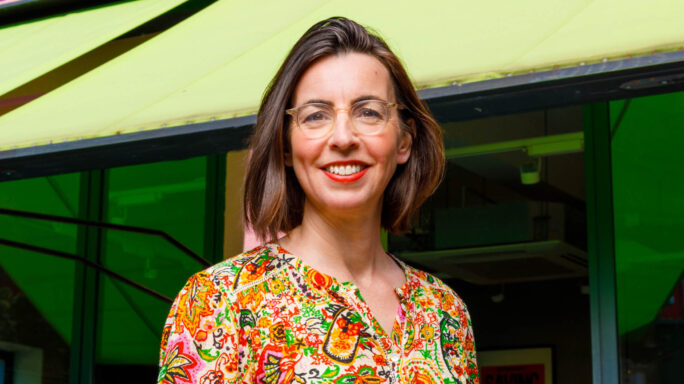Growth & Customers
Giving back after grief
Sunny Araf suffered the pain of losing his daughter but instead of giving up, he used his grief to build a better business and help others.

Never miss an episode
Subscribe to the Sound Advice podcast
Subscribe by email and get the Sound Advice podcast delivered to your inbox every month with a ton of related articles, templates and problem solving guides for small businesses so you can put our Sound Advice podcast into practice.
After suffering a life-changing event, many might have assumed that Sunny Araf would struggle to run his business and that he might even close it down altogether. However, this was not the case.
Sunny’s heartbreak from losing his daughter only fuelled his business journey as he wanted to build something she would be proud of and use his business to give back to those also suffering and in need.
This is an incredible story of how to cope with loss and use it to make a better business.
You can listen to the podcast, watch it or read the show notes right here.
Here’s what we cover:
- How to cope with grief while running a business
- Changing your definition of success
- Building a business to give your kids a better life
- Adapting your business to stay relevant and needed in a pandemic
- Share your journey with your friends and family, so they can understand your mission and your struggles
- Show appreciation to your family who support your business day in, day out
- Outgrowing your mentors
- Using your business to give back to people in need
- Inspiring the next generation of entrepreneurs
How to cope with grief while running a business
Kate Bassett:
Welcome to season two of Sound Advice: Entrepreneurs Unfiltered, brought to you by Sage.
I’m your new host, Kate Bassett, and this season we’re going to dig deeper than ever before to bring you raw emotive stories of resilience, loaded with business advice you can take away and try yourself.
Our first guest of the season is Sunny Araf.
Sunny dreamed of studying politics at university but ended up flipping burgers and cleaning toilets to provide for his family.
He went on to join West Midlands Police before starting his security company, ISA Support Services, in 2011.
Four years ago, Sunny lost his young daughter Khadijah to sepsis. It changed his life, and it transformed him as an entrepreneur. This is the inspiring story of how he’s giving back after grief.
Hi, Sunny. Thank you so much for joining us.
Sunny Araf:
Thank you, Kate. How are you?
Kate Bassett:
I’m good, thank you. How are you?
Sunny Araf:
I’m very well, thank you. Thank you so much for having me.
Kate Bassett:
It’s an absolute pleasure. Let’s dive straight in.
So you started ISA Support Services more than a decade ago and worked really hard to build up that business.
Then in 2018, your daughter passed away. Can you talk us through how you coped with that grief?
Sunny Araf:
Yeah, absolutely. I think, for anyone that’s suffered grief, I used to always think, Kate, that the day my parents passed away would probably be the worst day of my life.
I just had this understanding, and I’d often ask myself, “How am I going to cope with that day? What’s that day going to look like for me when mum and dad go?”
But I was wrong.
Actually, losing a child is probably the worst day of your life, and I hope no one has to go through that.
But Khadijah, she was a poorly child. She was born with a congenital heart defect, which meant that the two short years of her life, she spent at Birmingham Children’s Hospital, and she was pretty much in and out of hospital all the time.
I believe that it was almost like a training programme for us. I believe, God was preparing us for that day when we were finally going to say goodbye to our daughter.
But having spent the two years at the hospital and having seen all the hurt and pain that she had to go through with all the various surgeries that she went through, it was just our faith that got us through it, if I’m honest, Kate.
I’m a practising Muslim, and we believe that children go to heaven, and they’re in a better place. As a father of a daughter, I have three beautiful boys, and I was extra protective over Khadijah because she was my daughter.
I’d always worry, “Where is she going to end up when she gets married? If she gets married, what’s her husband going to be like?” And I was having these thoughts when my baby was a couple of months, that’s crazy.
But ultimately, after she went, I realised that I no longer have to worry about Khadijah because she’s a child of heaven, and she’s in a beautiful place.
I suppose having an amazing team around me that really supported me on this journey, and a very supportive family and a wife that, again, is the strongest person that I’ve ever met. It all kind of helped.
Kate Bassett:
But Sunny, I mean, I have two young daughters. The grief and devastation must have been unimaginable.
There must have been days where you didn’t even want to get out of bed in the morning.
How did you find the resilience to do that and carry on and run the business?
Sunny Araf:
Yeah, absolutely. There were days, there were weeks that I didn’t want to get out of bed. I was very fortunate because I had a fantastic business and an amazing team.
So my worry really wasn’t, is the business going to survive? How are we going to pay the mortgage? How are we going to pay bills? How are we going to pay for parking? That wasn’t my worry. So I was so blessed.
What I would often do is I would often focus on my ‘why’.
And that’s the message really, that’s really important, that when we go through times when things aren’t going to plan, and we’re suffering, whether it’s with grief or whether we’re suffering because the business isn’t doing well, we always need to focus on our ‘why’.
And why is it that we want to become successful? Why is it that we must become successful?
For me, there is no second chance, there’s no second choice. This is the first choice, and it’s plan A. And there’s no plan B. Sorry.
So I always focused on wanting to help other people because initially we started off helping families in the hospital because what we found was that families were struggling with, I mentioned, parking.
Birmingham Children’s Hospital is in the middle of the city centre, and often when your child’s rushed to hospital, you don’t plan anything.
People just leave their homes in an ambulance, or they drive their children to hospital, and then they realise that they will be staying in hospital, some of these parents for a very, very long time.
So we started helping families in the hospital with food and parking and just little things that when your child is poorly, the last thing you want to worry about is money.
You want to just spend all your time and energy on your child and be there for them.
So for me, it was just focusing on my ‘why’.
I had to get through this because I said, if anything like this ever happens again to me, and if I want to help people, the only way I’m going to be able to do that is if I have a successful business and I have the financial freedom to allow me to do that.
I’d come into board meetings, Kate, and I’d literally walk into the meeting and my whole team would be sat around the boardroom table. I’d sit down, we’d start the meeting, and I’d just break down and my team would just sit there in silence.
And I’d have a cry, and they’d have a cry, and I’d look up, and I’d be like, “All right, should we crack on with this?”
And they were like, “You sure you want to carry on?” I’m like, “Yeah, that’s fine.”
It was great because they almost knew exactly what to do.
That was our intimate moment, and it really brought us together as a team because they knew that I needed some space, I just needed to let it out. I just needed to have a cry. And that’s exactly what I did.
Again, some of the team members would be having a cry with me, and then I’d say, “Right, let’s get on with it.” And that went on for months and months, but we got through it, and we’re here today.
Changing your definition of success
Kate Bassett:
So I mean, losing Khadijah really did change your why, and you really channelled that grief into better causes. I know you set up the ISA Foundation.
Can you tell us about your goal with that and some of the projects that you are supporting?
Sunny Araf:
So the foundation was set up because we wanted to help vulnerable people.
Initially we wanted to call it the Baby K Foundation, but I didn’t want people to think that it was just a foundation that supports babies, for example, and that’s the only thing that we do.
The idea behind the foundation really is that it’s an avenue for us to give back to the world and not just here in the UK, but internationally.
Our focus with the foundation is supporting vulnerable people. When I say vulnerable people, initially we started working with refugees. We’ve worked with refugees from Syria for a very, very long time in neighbouring countries like Lebanon, Turkey, Iraq, and Jordan.
So I started visiting the refugee camps, and I did this even before Khadijah. I was working with the refugees.
So people like refugees, children that are poorly, I started working with a charity called Muntada Aid, and they’ve got an amazing project called the Little Hearts project.
I would travel with surgeons from all around the world to countries where children similar to Khadijah were suffering, and their parents couldn’t afford to have surgery.
So these surgeons blessed them, would give their own time, and would just conduct surgeries. It’s like a week intense of just conducting cardiac catheters, conducting surgeries for these children.
And that was the most, I think, I’ve been on many, many aid missions all the way around the world. And the foundation works with partners in a lot of countries.
But the Little Hearts project, like emotionally, I was an absolute wreck because I was spending a whole week in a hospital, and I was just surrounded by children that reminded me of Khadijah.
Everything made sense to me. All the terminology, the feelings that the parents were feeling.
But at the same time, it was the most amazing experience because standing with a mother and a father outside an operating theatre and the doctors coming out and telling them that their child’s going to be okay now because they’ve done the surgery.
And the look of relief on their face was something that for me was just unbelievable.
Khadijah had a purpose when she came into this world, and I believe that we’re fulfilling that purpose. So it’s just great. It’s just amazing being able to give back.
There is no other feeling, I believe in this world better than giving back.
I’ve been very fortunate and very successful in my life. And that used to excite me, that the success used to excite me. I’d get really excited about hitting targets, about increasing revenue and sales and profits every year.
But actually after Khadijah, I feel that there’s more to life.
So it’s about becoming successful and then giving back.
Kate Bassett:
She’s almost changed your definition of success, hasn’t she?
Sunny Araf:
Absolutely. I think success is different for most people, but for me, success is contentment. It’s being content with what we have in life.
If we can really focus on that and be happy with what we have, and what I always say to people is, focus on the things in life that money can’t buy.
So when you’re having a bad day because you’ve got out the wrong side of the bed, or because again, talking about business and business isn’t doing well, I want you just to look around and look at the things in life that money can’t buy.
Your partner, your parents, your children, your family, your friends. The fact that we are fit and well, and we are healthy.
If we start focusing on all these things, then we start becoming less reliant on these materialistic things in life that money can buy, and life becomes a lot simpler.
Building a business to give your kids a better life
Kate Bassett:
And talking about that simpler life, I mean, it was quite a struggle for you growing up, wasn’t it? I know your parents found it hard to make ends meet.
Can you just go back to why you started ISA in the first place? Some of those early struggles, getting the business off the ground, and what really inspired you to start it in the first place?
Sunny Araf:
Yeah, you’re right. We had an amazing childhood, Kate, but it was full of poverty. I don’t think there’s any way we can really sugar coat it.
Look, we were very fortunate that we always had a roof over our heads, and we were always in a loving family. And my mum and dad, God bless them, did an amazing job. But it was a struggle.
I remember that struggle. I remember that when times were really, really hard.
I remember when dad’s car would break down outside school, and we’d always dread driving up the hill because we always knew that the car would literally break down right outside the school when your friends are waiting for you outside school.
Seeing that from a very early age and seeing the struggle that my mum and dad went through, I made a decision very early on in life that I never wanted to be that person, that I didn’t want my kids to go through what I had to go through.
I didn’t want them to see what I saw as a child. The only way I was going to do that was through financial freedom. So I knew from a very early age that I really had to work my socks off and become somebody.
So the mission started very, very early. But after I left the police, it just felt like a natural progression for me to go into security. And that’s what I did.
I’ve never looked back, and I’m thankful for it.
Adapting your business to stay relevant and needed in a pandemic
Kate Bassett:
And in terms of getting to that stage of financial independence, for those listeners who haven’t heard of ISA Support Services, tell us a little bit more about what it does and give us a snapshot of the business now.
Sunny Araf:
So ISA Support Services is a professional support services provider. So we provide security officers, we provide receptionists, we provide concierge staff, we provide cleaners.
And of course, over Covid for the last three years, we diversified our business, and we were providing Covid testers and paramedics, and sometimes nurses and even doctors.
So we are a professional support services provider, and we operate across the country.
The best way for me to describe it is if you have an office building, often you walk into your office building, you have personnel sat at the reception desk, you may be greeted by a security officer in the car park.
That could be one of our members of staff, and then you have a reception person that sat there, or a concierge that could be someone that we provide.
You may walk past the cleaner or the cleaners that again, could be someone that ISA provide. So that’s what we do as a business.
Kate Bassett:
So actually you are responsible for all those unsung heroes who are in businesses keeping the organisations ticking.
Sunny Araf:
Absolutely. I’m super proud. We played a huge part in ridding the country of Covid, let’s just say, or bringing the curve down, as good old Boris [Johnson] used to say in his time.
We had thousands of staff members out in the field working when everybody was at home, because we didn’t have the luxury of being able to stay at home. We had to go out and do the job that needed to be done.
So we had staff working in the quarantine hotels, we had staff working at the Covid test sites, we had staff working at hospitals.
I believe that we played a huge part in helping the country get back to normal.
Share your journey with your friends and family, so they can understand your mission and your struggles
Kate Bassett:
You talked a little bit about work-life balance, in those early days you were working crazy hours and really running on empty.
Now you have a great team around you, financial independence, and I think I’m sure the experience of losing your daughter has really shifted your priorities as well.
What pointers do you have for other business owners on this? How do you prioritise? What are your tips?
Sunny Araf:
I think the first thing is that when you are alone working all hours of the day and night, know that you’re not on your own.
It’s really easy to think that you are the only person that’s doing this, but the reality is that there are millions of entrepreneurs out there that are working day and night to make ends meet and to grow their businesses.
But just remember that if you work really hard, and you know maintain that passion and that drive that you have in the early days, it won’t always be like this. It’s really easy to think that you’re going to spend the rest of your life working 24 hours, never seeing your family.
We have to make the sacrifices.
As entrepreneurs and business owners, there is an expectation that we have to make the sacrifices. So make the sacrifices, but at the same time, always share your journey.
Share your journey with people around you, so they understand why you are doing what you’re doing.
We know that a lot of marriages, for example, break down, Kate, because either the husband or the wife are out working trying to build a business and the other partner doesn’t understand that, and it creates this divide.
When I got married, my wife’s from Pakistan, and the first day that she came over from Pakistan, you can imagine the whole family around my home.
And we were having dinner, and then I went upstairs to start getting changed, and she followed me, and she said, “What are you doing?” And I was like, “I’m getting changed.”
She was like, “What? To go to work?” And I was like, “Yeah, absolutely. I need to go to work.”
And she was like, “But it’s my first day here and can you not take the day off?”
And that’s when I sat my wife down, and I had a really serious conversation with her.
I explained to her that I was trying to start a business and that if she sticks by me, and we do this together, I said, I promise you it won’t always be like this, but we have to make the sacrifices today and I have a job to go to, and I really need to go.
I just said that I really need your support and if you support me on this, I promise you it’ll be worth it in the end. I’m so glad that I had that conversation with my wife at that point because she’s supported me ever since.
We’ve never had to argue about why am I working so many hours. So it’s always a means to an end.
Share the journey with those that you love, make sure that they understand, share the journey. If people don’t understand, don’t waste your time trying to explain it to them.
I’m talking about friends and family. Just move on, surround yourself with a team that has brought into your vision and reward people, reward them before they ask to be rewarded. That’s the main thing.
Kate Bassett:
Love it that you’re giving us marriage tips on this podcast as well.
Sunny Araf:
Yeah, absolutely.
Show appreciation to your family who support your business day in, day out
Kate Bassett:
But you’re absolutely right because so often when there’s an entrepreneur in the family, it’s the partner who also bears the weight of the stress and the responsibility. And that often goes ignored, doesn’t it?
Sunny Araf:
I believe that partners don’t get the credit that they deserve.
This is why I always try and mention my wife, whether I’m on a podcast or I’m on an award ceremony or whatever I’m doing, because I could not have done this without my partner. That’s the reality.
There is no way that I would be able to give my business or my businesses the time that they require if I didn’t have a solid wife behind me. So they don’t get the credit.
Having a supportive family or for people that don’t have a big family, I’m very fortunate that I have a big family, but for people that don’t have a family, having a supportive friend structure is really important.
Share your dreams with them and people will laugh at you, and sometimes you’ll share your dreams and your vision, and your aspirations and people won’t get it. They won’t understand. And that’s when it becomes a very lonely place.
I always say this to my staff too, that if they do something wrong, I’m here to coach them, to counsel them, to tell them off and to make sure that we get it right the second time. But if I get it wrong, then who is there to support me? There’s no one to tell me off.
I mean, I’ve got a business partner, but he doesn’t really tell me off to be honest. But there’s no one really to tell me off to show me that I’m not doing things. So it can become a really lonely place and that’s when you have to share your goals and your dreams. And for me, it’s with my wife.
But I’m good because everything that I promised her, I’ve been able to deliver. So that has probably gone in my favour.
Outgrowing your mentors
Kate Bassett:
Other than turning to your wife, have you ever thought of getting a coach? Or who else do you turn to in those really tough moments?
Sunny Araf:
So I’ve had mentors, Kate. I’ve had mentors in the past, and I’ve had people that I look up to, but I’m probably in a position now where this is going to sound so bad, but I’ve outgrown my mentors in that sense.
It’s funny because one of my quotes used to always be work so hard where your mentors become your competitors.
So I had mentors, and I’ve outgrown my mentors in terms of how the business is doing and how I’m performing. And they’re actually contacting me now saying, “Sunny, it’s great that you’re doing so well.”
I’ve always said this, I take a lot of inspiration from my mum and dad, because I remember the struggles that they went to. To me, that generation, they are the real entrepreneurs. We were fortunate that while we were building a business, I lived at home with mum and dad, so I had that.
I didn’t have to worry about paying a mortgage for example, so I could really focus on my business, but they didn’t have that luxury. So people that came over from other countries and had to work really hard, they for me are my inspiration, and they’re the true entrepreneurs.
But I have people that I look up to, and I follow a lot of journeys of people online, social media or on YouTube. I try and keep in touch with what’s happening in the business world, for example. I take inspiration from, it doesn’t necessarily have to be somebody that’s doing really well.
I can take inspiration from anyone. People inspire me all the time. I can have a conversation with a 10-year-old child, and they can give me inspiration because I’m constantly learning.
I learn from my children too. I pick up so many amazing things from speaking to my boys. I have a daughter, another daughter I’ve had by the way, just for the listeners, so Rene is two years old and as you can imagine, she’s my best friend, and she’s my buddy, and she looks just like Khadijah, and she does things that Khadijah used to do.
She is my biggest fan like Khadijah was. And she really is my why, Kate, to be honest. That’s my reason to get out of bed every morning to make sure that I can give her the opportunities that she deserves.
Kate Bassett:
The absolute apple of your eye.
Sunny Araf:
Oh yes, absolutely.
Using your business to give back to people in need
Kate Bassett:
I’m sure there’s nothing more motivating than actually seeing first hand the difference that your money’s making.
Sunny Araf:
It’s the best feeling in the world, and it drives you. When I’m away, it’s really weird because I will start pinging emails,
I’ll be like in the middle of Africa somewhere, and I’ll be emailing the team saying, “I’ve had this idea and I think we should work on this kind of project.” And they get ready for it.
When I come back, I’m super excited. Why?
Because what enabled me to go to, let’s just say, for example to Ethiopia, what enabled me to go to Ethiopia, to fly to Ethiopia, to pay for the flights, to pay for my accommodation, to pay for, and then deliver a project that’s worth £30,000, £40,000, £50,000, for example.
It was the success that we have from the business. So if I want to go back to Ethiopia, to Africa or to anywhere and do that, the only way I’m able to do it is if my business is doing well, and we are earning money. That’s the reality of it.
The minute the business stops doing well, and I have no money left, Kate, I can’t go out, and I don’t want that ever taken from me, because we don’t fundraise.
The foundation is completely self-funded. So we have to, we have no second choice but to do well, so we can focus on the things that we love.
Eventually I’d like to become a full-time volunteer for the foundation where I can go out and just focus on projects and then get my kids in.
I took my wife out with me maybe a year after Khadijah passed away. We went out, I took her to Lebanon and there was a girl called Zainab and I met her when she was literally a five-month-old baby.
I walked past this refugee camp, and she was sat outside, and she has Down’s syndrome, but at the time her family didn’t realise that she had Down’s syndrome and I just connected with Zainab. It was just the weirdest thing that I had this connection.
And for those that follow me on social media will know who Zainab is.
So we spoke to her parents, and we try to do what we could. And every time we’d travel back to Lebanon, we’d always take gifts for Zainab and her family.
Then last year, they moved into some accommodation, and it was terrible because they were alienated as they were no longer living in a refugee camp, so they no longer had the support from the other NGOs.
So then when I went to Lebanon, I went to visit them and I took the team, and I was like, “This is the famous Zainab”, and she’s probably about five or six now.
And then we were then able to move Zainab and her family to better accommodation and to help their dad start up a business or get him into employment.
So for me, when I took my wife out, it was an amazing experience because I said, “This is Khadijah’s legacy and these are the kids.” I often think how proud that she would be of what we are trying to do here in the world. I can almost hear her saying, “Well done, Papa. I’m so proud of you.”
And every time I do go to these deployments, I can hear a voice in my head telling me, and I can see her face in the face of all these other children, regardless of who they are, where they come from, whether they have a disability or they don’t, or whatever religion or colour or race that they belong to.
For me, children are just so innocent, and they’re so vulnerable. If we don’t have people like us that support them, then they are completely on their own.
Khadijah had me and her mum and her loving family. There are children that don’t have parents, and we want to look after them kids that don’t have a family like Khadijah did.
Kate Bassett:
Khadijah would be so proud of you, Sunny. And you are right, the bigger your business grows, the more people you can help. So it’s an extraordinary and powerful mission.
Inspiring the next generation of entrepreneurs
Kate Bassett:
I also wanted to ask you about how you are inspiring the next generation of entrepreneurs.
I know you are mentoring a lot of people, but it comes with a contract. Can you tell us a little bit about that?
Sunny Araf:
So I’ve recently launched the Global Entrepreneurs Fund, and it’s a fund that I’m funding myself, and it will invest in entrepreneurs that come from underprivileged backgrounds.
We launched the first project in Pakistan. I went to Pakistan recently to help with the flood victims, and we launched the first projects of the Global Entrepreneurs Fund in Pakistan.
What we did was we sponsored 20 guys that came from very poor families that were historically having handouts from charities, and they were relying on handouts from locals and other NGOs. We set them up with businesses.
So they got fruit carts, and we set them up with their fruit carts, we set them up with the stock. The idea is they no longer have to rely on handouts, and they can provide for themselves and their family. And that’s the way we’re going to break them out of the circle of poverty.
But my contract with them and others that I mentor is that we will give you the tools to become successful. We will try and teach you how to become successful, but you have to give back.
Our deal with you is that we will try and help you on that journey, but when you make it to that stage, when you are earning enough money where you can provide and take care of all your own needs, but also provide to others, then you have to give back.
The mentoring programme that we’re about to launch will be a contract in that way. People have to sign the contract that if they’re going to come on to our mentoring programme, then they have to agree to give back.
Inspired by this small business story?
Wherever you’re listening or watching, subscribe to Sound Advice on Apple iTunes here.
We are also on Spotify and anywhere else you get your podcasts.
Join our community to share your insights and stories on Twitter @SageIreland using the hashtag #SoundAdvicePodcast, on Instagram @SageOfficial or in the comments below!
Want to know more about ISA Support Services and Sunny Araf?
You can check out ISA Support Services on their website.
Small business toolkit
Get your free guide, business plan template and cash flow forecast template to help you manage your business and achieve your goals.

Never miss an episode
Subscribe by email and get Sound Advice delivered to your inbox every month with the Sage Advice newsletter with a ton of related articles, templates and problem-solving guides for small businesses so you can put our sound advice into practice.










Ask the author a question or share your advice